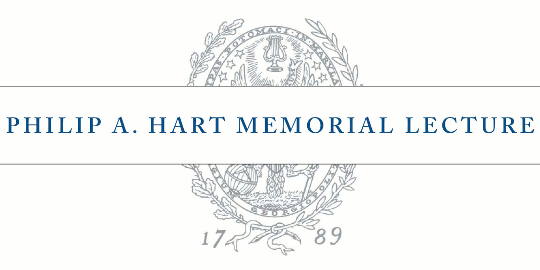Document Type
Lecture
Speaker
Rose-Ackerman, Susan
Date
3-18-1997
Description
In 1997, Professor of Law and Political Science, Susan Rose-Ackerman of Yale University, delivered the Georgetown Law Center’s seventeenth Annual Philip A. Hart Memorial Lecture: "The World Bank’s Role in Controlling Corruption."
Susan Rose-Ackerman is Henry R. Luce Professor of Law and Political Science, Yale University, and Co-director of the Law School’s Center for Law, Economics, and Public Policy. She holds a Ph.D. in economics from Yale University and has held fellowships from the Guggenheim Foundation and the Fullbright Commission. She was a visiting Research Fellow at the World Bank in 1995-96 where she did research on corruption and economic development. She is the author of Corruption and Government Causes, Consequences and Reform (1999), Controlling Environmental Policy: The Limits of Public Law in Germany and the United States (1995); Rethinking the Progressive Agenda: The Reform of the American Regulatory State (1992); and Corruption: A Study in Political Economy (1978); and joint author of The Uncertain Search for Environmental Quality (1974) and The Nonprofit Enterprise in Market Economies (1986). She has published widely in law, economics, and policy journals. Her research interests include comparative regulatory law and policy, the political economy of corruption, public policy and administrative law, and law and economics.
In this essay Professor Rose-Ackerman discuses how widespread corruption is a symptom that the state is functioning poorly. Ineffective states can retard and misdirect economic growth. International aid and lending organizations have begun to focus on corruption control as part of a general rethinking of their role in the post-Cold War world. Both James Wolfensohn, the President of the World Bank (Bank), and Michel Camdessus, the head of the International Monetary Fund (IMF), have put the control of corruption on their institutions' agendas.
Nevertheless, some argue that corruption is a political issue and is, therefore, outside the purview of the World Bank. Corruption, however, has fundamental economic impacts and is thus an appropriate area for World Bank and IMF concern. Bribes represent illegal user fees, taxes, or access charges paid to public agents. These payments influence economic decisions ranging from the size and character of public investment projects to the level of compliance with business regulations. It is difficult to see how a concern for the economic costs of corruption can be responsibly excluded from World Bank lending criteria.
Rights Statement
Scholarly Commons Citation
29 Law & Pol'y Int'l Bus. 93-114 (1997)
Included in
Banking and Finance Law Commons, Ethics and Political Philosophy Commons, Law and Economics Commons, Law and Politics Commons, Political Economy Commons

